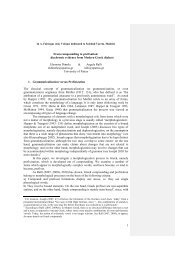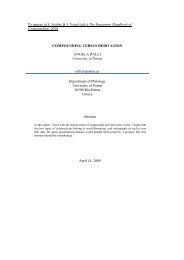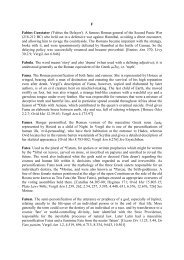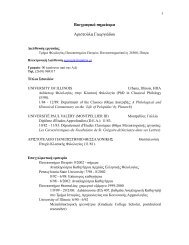Case mismatches in Greek: Evidence for the autonomy of morphology
Case mismatches in Greek: Evidence for the autonomy of morphology
Case mismatches in Greek: Evidence for the autonomy of morphology
You also want an ePaper? Increase the reach of your titles
YUMPU automatically turns print PDFs into web optimized ePapers that Google loves.
184 manuel espaol-echevarra and angela ralli<br />
(b) *Opju epileksume, i Anna tha tu dosi ena vravio<br />
whoever-gen choose-perf-1pl, <strong>the</strong> Anna fut him(cl)-gen- give-perf-3sg a prize<br />
(c) Opjon epileksume, i Anna tha tu dosi ena vravio<br />
whoever-acc choose-perf-1pl, <strong>the</strong> Anna fut him(cl)-gen- give-perf-3sg a prize<br />
On <strong>the</strong> contrary, as shown by (8bc), Accusative must surface on <strong>the</strong> relative<br />
pronoun if <strong>the</strong> matrix <strong>Case</strong> is Genitive. Our central claim concern<strong>in</strong>g <strong>the</strong><br />
<strong>Greek</strong> free relative paradigm presented <strong>in</strong> (3) and (7)(8) is that it cannot<br />
be accounted <strong>for</strong> <strong>in</strong> <strong>the</strong> strict limits <strong>of</strong> syntax, and that <strong>the</strong> morphological<br />
specication <strong>of</strong> <strong>Case</strong> <strong>in</strong> <strong>the</strong> relative pronouns, <strong>in</strong> <strong>in</strong>teraction with a number <strong>of</strong><br />
syntactic processes, is nally responsible <strong>for</strong> <strong>the</strong> facts <strong>in</strong> (3), (7)(8). Asyntactic<br />
account <strong>of</strong> <strong>the</strong> fact that <strong>the</strong> relative pronoun must surface <strong>in</strong> Genitive <strong>Case</strong><br />
if <strong>the</strong> verb <strong>in</strong> <strong>the</strong> free relative has a Dative <strong>Case</strong> feature (cf. <strong>the</strong> contrast <strong>in</strong><br />
(7)) can be provided on <strong>the</strong> basis <strong>of</strong> <strong>the</strong> dist<strong>in</strong>ction between <strong>in</strong>herent/structural<br />
<strong>Case</strong>. 5 Assum<strong>in</strong>g that Dative is an <strong>in</strong>herent <strong>Case</strong>, tied to -mark<strong>in</strong>g (cf. Chomsky<br />
1986b), and <strong>in</strong>volves a+Interpretable feature, we can make sense <strong>of</strong> why<br />
<strong>the</strong> Genitive <strong>for</strong>m <strong>of</strong> <strong>the</strong> relative pronoun, i.e., <strong>the</strong> expression <strong>of</strong> Dative abstract<br />
<strong>Case</strong>, is obligatory <strong>in</strong> free relatives <strong>in</strong>volvng a wh-cha<strong>in</strong> with Dative <strong>Case</strong>. The<br />
deletion <strong>of</strong> <strong>the</strong> relevant <strong>Case</strong> would lead to a violation <strong>of</strong> Full Interpretation. 6<br />
The behaviour <strong>of</strong> <strong>the</strong> Accusative, however, does not allow <strong>for</strong> a treatment <strong>in</strong><br />
terms <strong>of</strong> <strong>the</strong> <strong>in</strong>herent/structural dist<strong>in</strong>ction. Whatever choice we make <strong>for</strong><br />
Accusative, i.e., be it ei<strong>the</strong>r <strong>in</strong>herent or structural, we would not expect <strong>the</strong><br />
possibility <strong>of</strong> <strong>the</strong> relative pronoun surfac<strong>in</strong>g <strong>in</strong> Accusative to depend on whe<strong>the</strong>r<br />
<strong>the</strong> CLLD matrix cha<strong>in</strong> <strong>in</strong>volves Nom<strong>in</strong>ative, cf. (8a), or Genitive, cf. (8b).<br />
5<br />
6<br />
In <strong>Greek</strong>, <strong>the</strong> <strong>in</strong>direct object shows <strong>the</strong> same <strong>Case</strong> as adnom<strong>in</strong>al Genitives, as shown<br />
<strong>in</strong> (i):<br />
(i) a. Edosa tis Marias to vivlio<br />
gave-1s <strong>the</strong>-gen Maria-gen <strong>the</strong>-acc book-acc<br />
`I gave Maria<strong>the</strong>book'<br />
b. To vivlio tis Marias<br />
<strong>the</strong> book <strong>the</strong>-gen Maria-gen<br />
`Maria's book'<br />
We refer to <strong>the</strong> <strong>Case</strong> occurr<strong>in</strong>g <strong>in</strong> (iab) as Genitive, although, as <strong>the</strong> example <strong>in</strong> (ib)<br />
<strong>in</strong>dicates, this <strong>Case</strong> can also check Dative <strong>Case</strong>.<br />
A detailed presentation <strong>of</strong> this account falls beyond <strong>of</strong> <strong>the</strong> scope <strong>of</strong> this paper. Anumber<br />
<strong>of</strong> questions rema<strong>in</strong> unanswered at this po<strong>in</strong>t. For <strong>in</strong>stance, <strong>the</strong>re is no conclusive<br />
evidence <strong>for</strong> <strong>the</strong> <strong>in</strong>herent status <strong>of</strong> Dative <strong>in</strong> <strong>Greek</strong>. In addition, <strong>the</strong> ban on deletion <strong>of</strong><br />
<strong>for</strong>ms express<strong>in</strong>g <strong>in</strong>herent Dative <strong>in</strong> free relatives based on <strong>the</strong> +Interpretable status<br />
<strong>of</strong> this <strong>Case</strong> raises <strong>the</strong> question <strong>of</strong> why some <strong>for</strong>m <strong>of</strong> recoverability under deletion is<br />
not at play <strong>in</strong> <strong>the</strong>se cases.<br />
Acta L<strong>in</strong>guistica Hungarica 47, 2000










